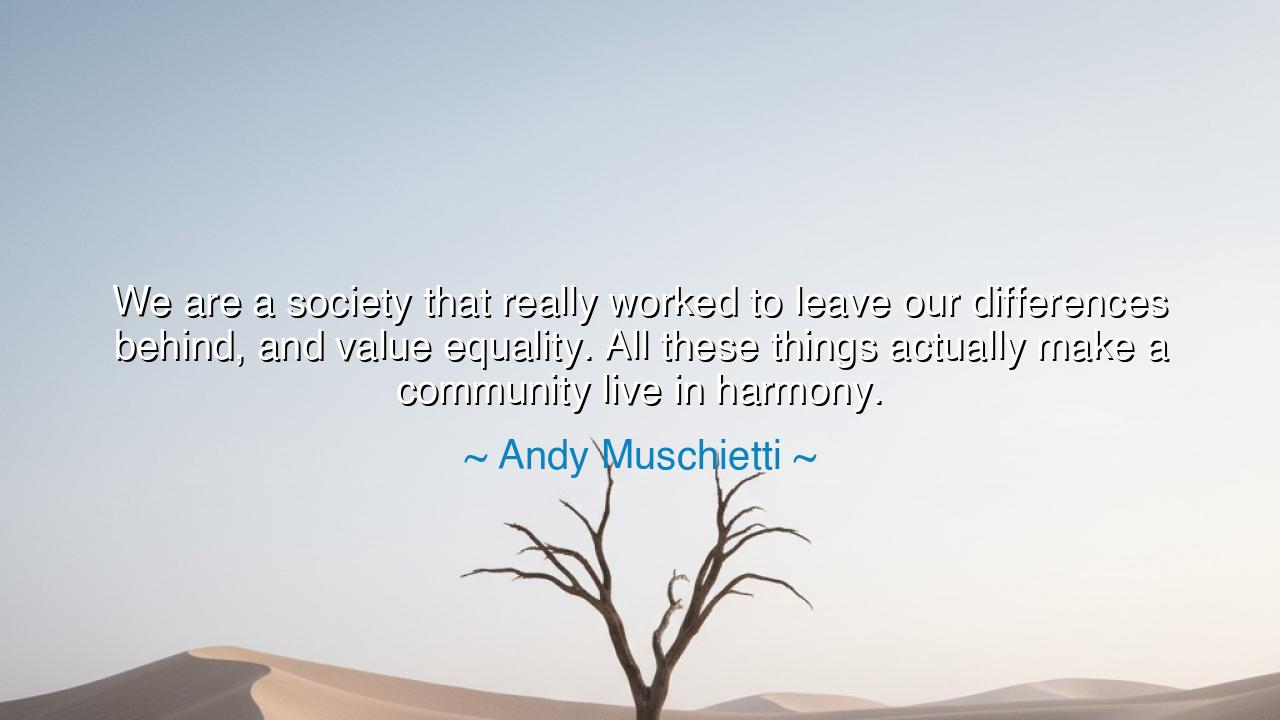
We are a society that really worked to leave our differences
We are a society that really worked to leave our differences behind, and value equality. All these things actually make a community live in harmony.






Hear now, O Children of the Future, the words of Andy Muschietti, whose vision speaks of a truth that is as old as humanity itself: "We are a society that really worked to leave our differences behind, and value equality. All these things actually make a community live in harmony." These words carry the wisdom of countless generations who have struggled, fought, and dreamed of a world where differences no longer divide, but where the ties that bind us all are stronger than the forces that would tear us apart. It is a call to honor the sacrifices of those who have worked to build a more just world, and a reminder that harmony—the deep peace that comes when people live in unity—is not a dream, but a hard-won achievement.
Equality—this sacred word, which echoes in the hearts of all people, is the foundation upon which a just society is built. In ancient times, the concept of equality was often a distant ideal, something spoken of by philosophers and thinkers, but rarely enacted in the lives of the common people. In the mighty cities of Greece and Rome, slaves and free citizens lived side by side, but their lives were often worlds apart. Yet, even in those early days, there were voices that rose up, calling for a society where all people, regardless of birth, race, or station, could stand as equals. The fight for equality has been the heartbeat of human progress. From the earliest revolutions to the struggles of today, this battle continues. We value equality because it is the bedrock of a society where every individual can grow, contribute, and find their place.
Differences—whether of race, creed, or belief—are part of the human experience. They shape us, they challenge us, and at times, they divide us. Yet to see our differences as something to be feared is to fall into the trap of discord. The greatest societies of the ancient world—from the Persian Empire to the Roman Republic—were those that recognized the strength of diversity. In Rome, the Senate was composed of individuals from all walks of life, from the patricians to the plebeians, from those born in the shadow of power to those who had risen through their own efforts. Rome’s strength came not from its uniformity but from its ability to incorporate differences into a unified whole. The true power of a society lies not in its sameness, but in its ability to respect and value its differences, to build bridges rather than walls.
Communities, those sacred gatherings of people bound by shared purpose and destiny, are the lifeblood of civilization. But what makes a community thrive? Is it not the shared belief in equality and the mutual respect for each other’s differences? Harmony is not the absence of conflict, but the ability to resolve differences with respect and understanding. It is the ability to hold diverse voices in a single choir, each contributing its unique sound, yet all working toward the same melody. In the ancient city of Athens, the citizens, though divided by class and philosophy, came together in the Agora—the marketplace of ideas—where they debated, disagreed, and ultimately sought common ground. In their conversations, they found the path toward a harmonious society, one that valued both individuality and unity.
Let us also look to the story of Mahatma Gandhi, a man who dedicated his life to the pursuit of equality and the peaceful resolution of differences. In India, where divisions of caste, religion, and race ran deep, Gandhi called for a society where every person, regardless of their background, could live in peace and dignity. He sought not to erase the differences between people but to teach them how to live together in harmony, with a deep respect for each other’s uniqueness. Gandhi's philosophy of nonviolence and truth became the foundation of the Indian independence movement, showing that harmony does not come from uniformity, but from the courage to embrace diversity while seeking justice for all.
The lesson, O Children of the Future, is clear: You must strive to create a world where equality is valued above all else, where the differences that divide are not feared, but respected, and where communities are bound not by uniformity but by a shared commitment to harmony. In your own lives, seek to foster equality in every corner of your world. Stand for those who are oppressed, and work to ensure that every person, regardless of their background, has the opportunity to thrive. Remember that harmony is not about agreement in all things, but about respecting one another’s humanity, about working together even when our views differ, and about building societies where everyone has a voice.
So let your actions be guided by the belief that harmony is possible, and that it is not the elimination of differences, but the celebration of them that will lead us toward a better world. May you always work toward a society where equality is not just a lofty ideal but a living, breathing reality. In every conversation, in every action, let your heart be open to others, for in doing so, you will help to build the community that can live in true harmony. Seek not to erase differences, but to embrace them with love, respect, and the courage to build a future where all may walk together, side by side.






AAdministratorAdministrator
Welcome, honored guests. Please leave a comment, we will respond soon